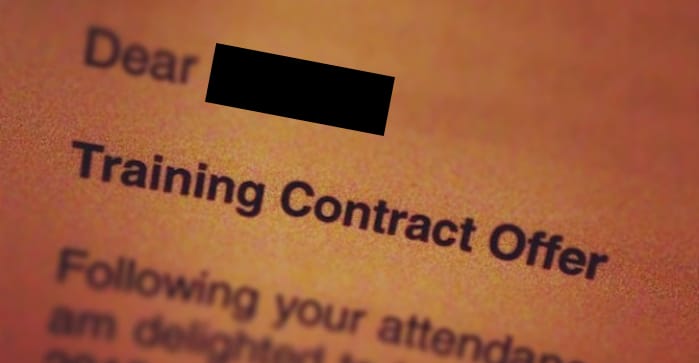Advice from a future Magic Circle trainee

1 September marked the start of the 2026 trainee recruitment cycle. Future Magic Circle trainee and Legal Cheek writer Ryan Scott shares his top tips for securing a coveted training contract this application season.
1. Meet as many firms as possible
That dreaded application form staple — “why this firm?” — is often the first and hardest hurdle for future trainees to cross. From the outside, City firms can look very similar: international presence, ‘dynamic’ work, Band 1 rankings… basically, a load of corporate waffle.
Meeting firms directly, however, gave me a much clearer picture — not just of their practice areas and sector strengths, but of their culture, their people, and whether I could actually see myself fitting in.
Open Days run throughout September to December (and many firms reimburse travel!). You can tour offices, chat to trainees and partners, and pick up tips for the application process.
Legal Cheek also runs its Virtual Law Fairs and firm-specific events throughout the application season. I attended last year while doing my applications, and skipping through the different firms’ booths felt a bit like speed-dating: some I clicked with straight away, others I knew weren’t a match, and a few surprised me completely — ones I’d never even considered until I met them.
To keep this long-winded metaphor going, it’s also where I met the ‘one’ for the first time — my future firm.
2. Figure out what matters most to you
Be honest about your priorities. A fat salary? A plush office on Bishopsgate? Free weekends?
For me, it was Band 1 rankings across the board — that way, I could explore a variety of seats, confident I’d be working on top-quality matters while learning from the best. A large trainee cohort and strong international presence mattered too. This might make some feel like just another cog in the machine, but I saw it as a chance to connect and collaborate with colleagues across the globe.
Others might prefer the smaller cohorts on offer at some boutique or US firms, where trainees take on much greater responsibility from day one and face a steeper learning curve.
A great starting point is The Legal Cheek Firms Most List (and I don’t just say that because I work here now), which lays out the number of trainees, salary, working hours, international presence, secondment opportunities, and more.
3. Create a shortlist of firms
Once you know your priorities, narrow your focus to around 10-15 firms — and dive deep. Clifford Chance alone received 5,804 applications in 2022. I’d hazard a guess that the other Magic Circle firms were broadly similar, putting the total combined applications for the quintet in the tens of thousands each year.
A scattergun approach to applications — sending generic applications to dozens of firms in the hope that one sticks — rarely works. By creating a shortlist, you can dedicate more time to research, tailor each application properly, and keep deadlines manageable.
Last year, I whittled my list down to 12 firms that aligned with my priorities, and that excelled in the practice areas and sectors I was interested in (more on this later).
4. Track deadlines
Plan ahead. Application season moves fast, and December will sneak up before you know it.
I was working full-time as a paralegal while applying, balancing the 9–5 office job with the 5–9 application grind — and sacrificing my annual leave to travel down to London for Open Days. Focusing on only 12 firms made this (slightly) more manageable.
Record each firm’s deadlines for vacation schemes and training contracts — Legal Cheek’s Key Deadlines Calendar is great for this. And check if deadlines are rolling: Slaughter and May, for example, reviews applications as they come in, so early submission is key. An 11:59pm submission on deadline day probably won’t cut it.
5. Go beyond the surface
The Legal Cheek Firms Most List is a brilliant starting point, but don’t stop there. Dig into firm websites, Chambers and Legal 500 rankings, reports, podcasts, newsletters, articles, even LinkedIn posts.
Focus on what genuinely interests you — it makes your application read far more authentically. In my case, that was the net-zero transition. I went to webinars and combed through firm websites to find specific deals I could namedrop in applications and interviews.
Handily, Legal 500 even provides “work highlights” for each practice area, showcasing the matters that firms are particularly chuffed with.
6. Reach out to current trainees
Messaging trainees on LinkedIn feels a bit like cold-calling — but in my experience, it’s nothing to stress about.
Every trainee I’ve reached out to has been extremely generous with their time. And remember: most are only a couple years older than you and can vividly recall the trials and tribulations of application season.
But be respectful of their time. Generic and open-ended questions like “Tips for a TC?” rarely get replies. Do your homework — maybe a bit of LinkedIn stalking — then ask about the seat they’re in or what they enjoy most about it. Show you’ve thought about your question, and you’ll get a far better answer.
7. Organise your research
All that research is useless if it’s saved in some random folder on your computer that you’ll never find again. Find a system that works for you to collate and organise it. Mine was a giant Excel spreadsheet (aptly named “Firm Megatable”).
Firm names ran across the top row, and areas of research down the first column — practice area specialisms, key sectors, legal tech, big-name clients, training contract structure, secondments, pro bono, diversity initiatives, recent mandates, and so on.
The beauty of the Megatable was being able to compare firms easily. You can see at a glance in which areas Firm A is stronger than Firm B — which then feeds straight into tailored answers.
Whether you like Word, Pages, or a notebook with pretty highlighters, the key is to have one system and update it consistently.
8. Tailor your applications: why, why, why
One of the biggest mistakes I see is failing to answer the “Why?”.
“I attended a webinar on the firm’s net-zero work.” Great — and? What did you learn? Why does that motivate you to apply here? Did it spark further research, or interest in a specific deal or report? Go deeper, and show some genuine engagement. It’s all about linking your experiences to your motivations.
If you reference a deal, don’t just say “I found this interesting.” Explain why — the regulatory complexity, the cross-border elements, the financing structure — and then link it back to the firm’s strengths and your reasons for applying.
9. Don’t be afraid to stand out
Early Talent teams sift through thousands of applications each cycle. The last thing they want to see is the same copy-pasted, ChatGPT-ified paragraphs on a loop. Authenticity is an asset.
Non-legal experiences can be extremely compelling. While some candidates may have completed every vac scheme in the City, balancing part-time work for years alongside your studies can demonstrate more dedication and resilience than a brief two-week stint at a firm.
It’s all about drawing connections between your experiences (legal or not) and the skills needed as a trainee.
In a recent interview I did with future trainee Layla Qazi, she drew on “unorthodox” experiences — including building a university roller-skating society from the ground up — to evidence her leadership, collaboration and initiative. She went on to secure a training contract at Taylor Wessing.
10. Build your commercial awareness
“Commercial awareness” — the buzzword that sends chills down fledgling lawyers’ spines. It isn’t a single skill; it’s a habit of noticing how organisations make decisions, how firms make money, and how headlines affect clients. You won’t become the next Alan Sugar after one binge of the FT; commercial awareness builds up gradually. As the saying goes, it’s a marathon, not a sprint — so start early, not the night before applications.
My top resources:
• Books: All You Need to Know About the City by Christopher Stoakes makes complex economic and business concepts accessible and easy to understand.
• Newsletters: LittleLaw and Legal Cheek Weekly Round-Up are both free. Watson’s Daily (paid) breaks down headlines into ‘what this means for industry X’ — the exact skill you need to build for interviews and case studies.
• Podcasts: FT Daily Briefing and Legal Cheek Podcast during my morning commutes.
• News: CityAM (free), and the FT (if your university provides access because £39/month is steep).
Closing note…
Everyone’s journey is different, and comparison is the thief of joy. Don’t try to mould yourself into what you think a corporate lawyer should look like — be yourself and focus on what matters to you. Research thoroughly and craft applications that genuinely reflect your interests and personality.























